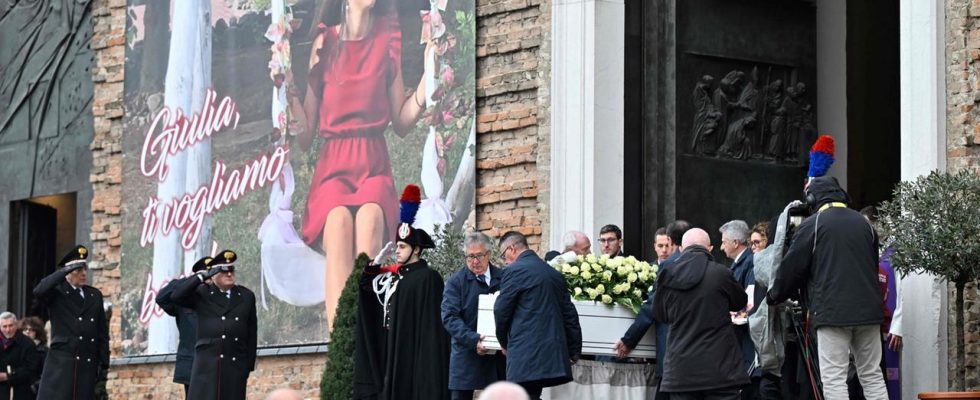The murder of 22-year-old Giulia Cecchetin was the 103rd femicide in Italy this year. But her death triggered a change – also because her surviving sister Elena found powerful words.
Gino Cecchetin, father of the murdered Giulia, steps to the microphone in the Basilica of Santa Giustina in Padua. Thousands of people in the church and on the piazza in front of it listen to him. Several television channels broadcast live. Cecchetin appears composed, his second, remaining daughter Elena buries her face in her boyfriend’s arms. The men have to change in Italy, Gino explains calmly, before he speaks directly to Giulia and says goodbye to her.
The violent death of 22-year-old Giulia Cecchetin has shaken Italy: Thousands of people are standing in cold, wet weather on the Prato della Valle in front of the church, one of the largest squares in Europe, with flags at half-mast. The young woman was murdered by her ex-boyfriend. The perpetrator was on the run for days and was finally caught in Germany near Halle. He has now made a confession. It is already the 103rd femicide in Italy this year. No one before him has shaken the country so deeply and questioned the current everyday culture so much.
Giulia’s violent death caused great sympathy in Italy – and even provided the impetus for a law to better protect against stalking.
“Filippo is not a monster”
Every third day in Italy a woman dies due to domestic violence – the numbers are similar to those in Germany. Unlike in Germany, the media regularly reports on the acts of violence, questions relatives and rings the bells of the victims’ neighbors. However, these acts have so far hardly shaken society. This is different now.
After Giulia’s death, students from northern Italy to Messina demonstrated. The common symbol for the protest is the bunch of keys being shaken loudly. People came together in Rome for the largest protest march at the end of November; according to the organizers, there were said to be 500,000 women and men. It is a protest from below, no union or party had mobilized people. The outcry is having an effect: Parliament, in rare agreement, unanimously passed a tightening of protection for women against stalking.
Why this outcry now? The fact that Giulia’s murder sparked such a movement is probably due to the combative reaction of Giulia’s sister Elena Cecchetin. She called for looking at the systemic problem of the oppression of women instead of looking at Giulia’s ex-boyfriend Filippo as an individual perpetrator. “Filippo is not a monster,” she said on television, “he is a child of pervasive patriarchy and a culture of rape.”
Dependence on patriarchal structures
She seems to have hit a nerve with this. Since then, Italy has been discussing how patriarchal society still is. With Giorgia Meloni, the country has a woman as head of government for the first time, and the leader of the largest opposition party PD is Elly Schlein, also a woman for the first time. But the awakening in these weeks is not coming from politics, but from civil society, especially from young people: Many young women do not trust Meloni, as the leader of a right-wing conservative coalition, to fight for more self-determination for women. Meloni was explicitly not invited to the large demonstration in Rome.
There is still no talk of equality in everyday Italian life. For example, women’s material dependence on their husbands remains high. There are hardly any childcare places available for children, especially in the south of the country. The result: women, who on average have a higher level of education than men in Italy, are forced to put their professional ambitions on hold. The resulting material dependence makes it difficult to separate from a potentially violent man. Conversely, men giving up their careers for the sake of their family and their wives is still a rarity in Italy.
Perpetrator-victim reversal by public figures
A patriarchal behavioral pattern is also deeply anchored culturally, says psychologist Anna Valeria Lisi. She treats violent men. They come from all social classes, she says. Even though the social picture in Italy has ostensibly changed, many men continue to resort to patriarchal behavior in moments of uncertainty. This means that they then try to dominate and control their partners.
In the public debate about violence against women, the perpetrator-victim reversal occurs again and again: the woman is held jointly responsible for the violence, for example by being accused of having provoked an attack by wearing revealing clothing. Prime Minister Meloni’s ex-partner also used this thought pattern when he publicly asked young women not to drink alcohol in order to avoid rape.
The funeral service for Giulia Cecchetin was attended not only by thousands of people from Padua, but also by more than 40 mayors from the Veneto and Friuli regions, as well as the region’s president, Massimiliano Fedriga. At the same time, President Sergio Mattarella took the floor. Bishop Claudio Cipolla said in his homily: “We must transform pain into commitment.” It seems as if the moment has come for this in Italy.

